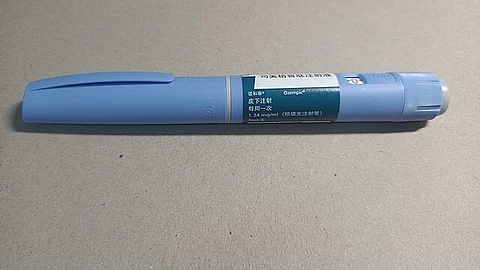

New research from Cedars-Sinai suggests people who are scheduled for certain medical procedures should stop taking popular weight loss drugs in the days or weeks prior to avoid complications.
Investigators found glucagon-like peptide-1 receptor agonists (GLP-1RAs)—medications like Ozempic and Wegovy that are used to treat diabetes and obesity—are associated with an increased risk of aspiration pneumonia following endoscopy. The large, population-based study is published in the leading peer-reviewed journal Gastroenterology.
Aspiration pneumonia is caused by inhaling foreign materials—including food in the stomach, or secretions from the mouth and nose—into the lungs. Endoscopy is a medical procedure in which a physician puts a tube-like scope down a patient’s throat and into the body to look inside.
One way the new obesity medications work is by slowing digestion, so people feel full longer, causing them to eat less. This also means that food sits in the stomach longer. As a result, the stomach may not empty completely during the usual duration of fasting that is recommended ahead of a surgical procedure to decrease risk of aspiration, explained the study’s corresponding author, Ali Rezaie, MD, medical director of the GI Motility Program and director of bioinformatics at the MAST Program at Cedars-Sinai.
“Aspiration during or after endoscopy can be devastating,” Rezaie said. “If significant, it can lead to respiratory failure, ICU admission and even death. Even mild cases may require close monitoring, respiratory support and medications including antibiotics. It is important we take all possible precautions to prevent aspiration from occurring.”
The study analyzed data from nearly 1 million de-identified U.S. patients who underwent upper or lower endoscopy procedures between January 2018 and December 2020. Patients who were prescribed GLP-1RA medications had a 33% higher chance of experiencing aspiration pneumonia than those who did not take these medications before the procedure. This comparison also considered other variables that could influence the outcome to ensure a fair comparison between the two groups.
“When we apply this risk to the more than 20 million endoscopies that are performed in the U.S. each year, there may actually be a large number of cases where aspiration could be avoided if the patient safely stops their GLP-1RA medication in advance,” Rezaie said.
“The results of this study could change clinical practice,” said Yee Hui Yeo, MD, first author of the study and a clinical fellow in the Karsh Division of Gastroenterology and Hepatology at Cedars-Sinai. “Patients taking these medications who are scheduled to undergo a procedure should communicate with their healthcare team well in advance to avoid unnecessary and unwanted complications.”
Additional Cedars-Sinai authors involved in the study are Srinivas Gaddam, MD, MPH; Ruchi Mathur, MD; Rabindra Watson, MD; and Jamil Samaan, MD. Additional authors include Wee Han Ng; Pin-Chia Huang, BS; and Kevin Sheng-Kai Ma, DDS.
(Newswise/KB)
